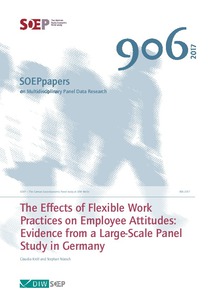The effects of flexible work practices on employee attitudes: evidence from a large-scale panel study in Germany
"We explore the effects of flexible work practices (FWPs) on the work attitudes (job satisfaction and turnover intention) and non-work attitudes (leisure satisfaction and perceived health) of employees based on representative large-scale German panel data. Because unobserved individual characte...
| Main Authors: | , |
|---|---|
| Institution: | ETUI-European Trade Union Institute |
| Format: | TEXT |
| Language: | English |
| Published: |
Berlin
2017
DIW |
| Subjects: | |
| Online Access: | https://www.labourline.org/KENTIKA-19394659124911128319-The-effects-of-flexible-work-p.htm |
| Summary: | "We explore the effects of flexible work practices (FWPs) on the work attitudes (job satisfaction and turnover intention) and non-work attitudes (leisure satisfaction and perceived health) of employees based on representative large-scale German panel data. Because unobserved individual characteristics can easily act as confounders, we estimate both pooled OLS models and individual fixed-effects models. Controlling for time-constant individual heterogeneity, we find that the three considered FWPs—flexitime, sabbaticals and working from home—significantly increase job satisfaction and that sabbaticals and working from home (but not flexitime) significantly decrease turnover intention. In addition, sabbaticals but not flexitime or working from home significantly increase leisure satisfaction. The effects of FWPs on health are mostly weak and statistically insignificant. Models that do not control for such individual heterogeneity either underestimate the positive effects of FWPs or find detrimental effects. Our findings indicate that organizations in Germany can increase job satisfaction and decrease employee turnover intention by offering FWPs." |
|---|---|
| Physical Description: | 29 p. Digital |

